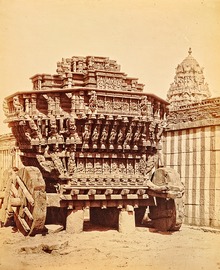Juggernaut



A juggernaut (UK: /ˈdʒʌɡərnɔːt/ , US: /-nɒt, -nɔːt/, JUG-ər-not[1]), in current English usage, is a literal or metaphorical force regarded as mercilessly destructive and unstoppable. This usage originated in the mid-nineteenth century[2] as an allegorical reference to the Hindu temple cars of Jagannath Temple in Puri, which apocryphally were reputed to crush devotees under their wheels.[3]
Overview
The figurative sense of the word has ground in mechanics comparable to figurative uses of steamroller or battering ram to mean something overwhelming. Its ground in social behavior is similar to that of bandwagon, but with overtones of devotional sacrifice. Its British English meaning of a large heavy truck[4] or articulated lorry dates from the second half of the twentieth century.[2]
The word is derived from the Sanskrit Jagannātha (Devanagari जगन्नाथ) "world-lord", where jagan means the world and natha means lord, one of the names of Krishna found in the Sanskrit epics.[5]
The English loanword juggernaut in the sense of "a huge wagon bearing an image of a Hindu god" is from the 17th century, inspired by the Jagannath Temple in Puri, Odisha, which has the Ratha Yatra ("chariot procession"), an annual procession of chariots carrying the murtis (statues) of Jagannâth, Subhadra and Balabhadra (Krishna's elder brother).
The first European description of this festival is found in the 14th-century The Travels of Sir John Mandeville, which apocryphally[6] describes Hindus, as a religious sacrifice, casting themselves under the wheels of these huge chariots and being crushed to death. Others have suggested more prosaically that the deaths, if any, were accidental and caused by the press of the crowd and the general commotion.[7]
The term is used literally in Jane Eyre, where one character describes her as "worse than many a little heathen who says its prayers to Brahma and kneels before Juggernaut",[8] suggesting that it would have been fairly widely understood when it was published in 1847.
The term is used in Charles Dickens' The Life and Adventures of Martin Chuzzlewit published in 1844, to describe the love-lorn sentiments of Mr. Augustus Moddle, the 'youngest gentleman' at Mrs. Todgers: "He often informed Mrs. Togders that the sun had set upon him; that the billows had rolled over him; that the Car of Juggernaut had crushed him; and also that the deadly Upass tree of Java had blighted him."
The figurative sense of the English word, with the idea of "something that demands blind devotion or merciless sacrifice" became common in the mid-nineteenth century. For example, it was used to describe the out-of-control character Hyde in Robert Louis Stevenson's Dr. Jekyll and Mr. Hyde.[9] Other notable writers to have used the word this way range from H.G. Wells[10] and Longfellow[2] to Joe Klein.[3] Bill Wilson in Twelve Steps and Twelve Traditions of Alcoholics Anonymous describes "self-sufficiency" in society at large as being a "bone-crushing juggernaut whose final achievement is ruin." To the contrary, Mark Twain (autobiography, vol 2), describes Juggernaut as the kindest of gods. Any pretentious to rank or caste do not exist within its temple.
Many speakers and writers apply the term to a large machine, or collectively to a team or group of people working together (such as a highly successful sports team or corporation), or even a growing political movement led by a charismatic leader—and it often bears an association with being crushingly destructive, with one early use of the word construing it as a synonym for Moloch.[2]
In popular culture
In fiction and games, the name "juggernaut" is often used to refer to some great and powerful creature, machine or vehicle. Examples include:
- A class of hero in Dota 2 whose power is derived from using attacks which provide invulnerability, such as unstoppable force implies.
- A large opponent with a large amount of health in Call of Duty: Modern Warfare 2 that wears a bomb disposal suit and carries a large automatic weapon.
- The Juggernaut, a character from Marvel's X-Men comics, who is imbued with the divine power of the fictional war god Cyttorak, and made virtually unstoppable and invulnerable.
- The collectible card game Magic: The Gathering features "Juggernaut" as an artifact creature that must attack every turn and cannot be blocked by Walls.
- In the Star Wars universe, the ten-wheeled "clone turbo tank" is better known as "HAVw A6 Juggernaut" and is an upgraded version of the HAVw A5 Juggernaut.
Progressive metal band Periphery released Juggernaut: Alpha & Juggernaut: Omega in 2015
It is sometimes spelled juggernaught, possibly due to a conflation with the word dreadnaught/dreadnought, which can be used with a similar meaning.
References
- ^ Jones, Daniel (2003) [1917], English Pronouncing Dictionary, Cambridge: Cambridge University Press, ISBN 3-12-539683-2
{{citation}}: Unknown parameter|editors=ignored (|editor=suggested) (help) - ^ a b c d "Juggernaut". Oxford English Dictionary (Online ed.). Oxford University Press. (Subscription or participating institution membership required.)
- ^ a b "Learn a New Word". Retrieved 2014-02-13.
- ^ "Definition of JUGGERNAUT". Merriam-Webster. Retrieved 7 April 2013.
- ^ "dictionary.reference.com". Dictionary.com.
- ^ Juggernaut, Online Etymology Dictionary
- ^ Rath Yatra: The Chariot Festival of Puri, India
- ^ Jane Eyre chapter 7
- ^ Jane Lilienfeld "Review of Thomas Reed's The Transforming Draught: Jekyll and Hyde, Robert Louis Stevenson and the Victorian Alcohol debate", Victorian Studies Vol. 50 Issue 1, 2007.
- ^ "Wiktionary". Retrieved 2014-02-13.
External links
 The dictionary definition of juggernaut at Wiktionary
The dictionary definition of juggernaut at Wiktionary
